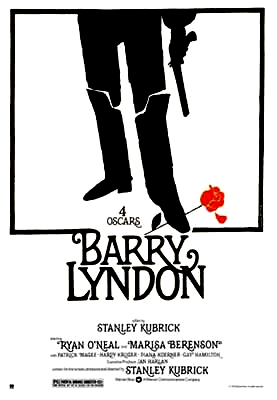
Barry Lyndon opens in wide shot - this is not uncommon with Kubrick, but it is used for a drastically different effect. Consider the opening image of 2001, designed to overwhelm our senses; or The Shining, with its labyrinthine helicopter shots teasing our anticipatory sense of dread. But from its first image, which depicts the death of the protagonist's father in a duel, Barry Lyndon keeps us at a distance. Kubrick and cinematographer John Alcott (with the help of a Zeiss lens originally used by NASA) create a period piece with an astounding sense of immediacy, the image of the opening duel composed with such astonishing depth and clarity that we feel present in the action. But rather than using the images to pull us in, Kubrick remains remote, a time traveller observing the alien behaviors and practices of 18th-century Europe. This gives each shot an oppressive weight, as though each moment were a slide examined through the microscope lens; this deterministic approach is perfect for a protagonist who remains almost totally passive in his own fate. We meet Redmond Barry (Ryan O'Neal) as a sullen, lovestruck youth and follow him across the continent as he wins and then loses everything through no fault or effort of his own.
Kubrick uses O'Neal's vacant screen presence brilliantly - Barry is a cipher who is able to deceive his way into wealth and status not through any particular talents of his own but out of sheer luck (indeed, the Thackeray novel upon which the film is based was originally titled The Luck of Barry Lyndon). The scene when Barry romances the wealthy, widowed Lady Lyndon (Marisa Berenson) is a masterpiece of surfaces, both actors photographed like perfectly-made porcelain dolls similarly incapable of demonstrating actual emotion. The narrator (Michael Hordern) assures us they have fallen in love, a fact we might have otherwise missed; throughout, the narration dryly mocks these characters' half-realized aspirations and lays bare their actual motivations (in original editions of the book, occasional notes from the editor served the same purpose). These characters have no apparent inner selves, substituting manners for morals and objects for ideas. The meticulously recreated props and costumes, along with the striking period locations, supply not just the film's style but its meaning - Kubrick simultaneously fetishizes the art and culture of the period while attacking the shallow materialism of his characters. Kubrick's films are frequently about the struggle of the individual; here, the individual has receded into the background, upstaged by the tapestries. It's as sharp a comment about the present as it is the past.
The film builds deliberately, almost to the point of boredom - what would constitute a good 40 minutes' worth of action in other films stretches past the intermission here. We begin to wonder why Kubrick has forced us to endure this endless parade of images that make us feel nothing. It's actually a setup, and Kubrick snares us with the introduction of the adult Lord Bullingdon (Leon Vitali), Barry's stepson, who returns after a childhood of petty torments from his ineffectual stepdad to assert his rightful claim to his family's wealth. The moment when Bullingdon uses his smirking half-brother to interrupt a concert with a clomping pair of boots is a genuine shock; by destroying the sustained audiovisual symmetry, its as if violence has been done to the film itself. Kubrick presents our children as the only beings we must ultimately answer to - this is paralleled, devastatingly, with the death of Barry's own son after his fall from the horse that was the boy's birthday present. We do not see the fall happen at first; then, as the boy recounts it, Kubrick cuts suddenly, jarringly, to an image that represents everything we reach for and fail to attain. Dissonant noise replaces Schubert on the soundtrack for one moment, exposing the underlying chaos that we attempt to overrule by creating our own meaning. In this sense, Barry Lyndon is also a comment on the cinematic apparatus, which cannot help but recreate a reality that it was designed to reproduce.
Barry Lyndon, more than any of Kubrick's other films, invites the oft-repeated criticism of the director as a cold, calculating misanthrope, and it's certainly his chilliest film. However, while Kubrick's evaluation of humanity is unsparing, the film is almost religious in its search for meaning in the meaningless. Late in the film, Barry finally commits a selfless act, for which he is mercilessly punished. Kubrick has no sympathy for overdue introspection; his films attest to his understanding of existence as an ongoing practice that may eventually be perfected, and as the ending of 2001 demonstrated, he was capable of great hope. So while Barry Lyndon is far from Kubrick's cuddliest picture, it is nevertheless a perfect, dazzling example of the search for truth even in the most untruthful of worlds.
3 comments:
Martin Scorsese has said that Barry Lyndon is his favorite Kubrick film, and it's easy for me to see why. This may be the most beautifully lit film ever made.
I love the way Kubrick recreates the music, art and ceremony of the past, while commenting on how little any of that matters at the end of a man's life.
Good review, Andrew.
Thanks for this piece, Andrew. I have had a similar history with the film and cannot wait to revisit it, especially now. I remember when it first came out and how blown away everyone was at the miraculous photograpy of John Alcott. Now I'm looking forward to experiencing again the element of the movie I may have been too young to understand-- that is, what Kubrick himself brought to it.
Thanks, both of you! Dennis, your piece on New York New York had the same effect on me - it's a movie I respected that left me cold, but you underlined some interesting possibilities about it that I hadn't really considered. I can't wait to give it another look.
Post a Comment